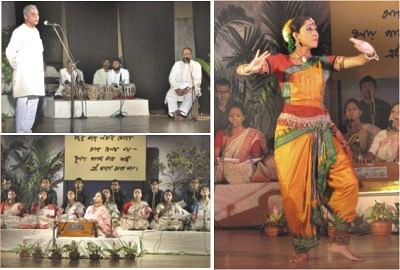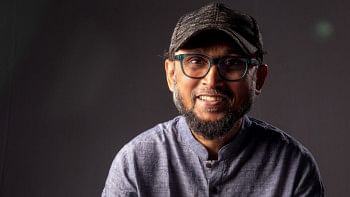A century of “Geetanjali”

Clockwise (from top-left) Professor Sanat Kumar Saha delivers his speech; Sudeshna Swayamprabha dances at the programme;Mita Haque and co-artistes sing.
As this year marks a century of Tagore's Nobel Prize-winning work “Geetanjali”, Chhayanaut held an exclusive speech on the publication at the main auditorium of Chhayanaut Shangskriti Bhaban on September 24. Professor Sanat Kumar Saha of Rajshahi University delivered an elaborate, and eloquent speech on “Geetanjali” at the event.
The event was part of Chhayanaut's yearlong programme celebrating Nobel laureate poet Rabindranath Tagore's 150th birth anniversary.
The programme began with a group rendition of “Oi Mohamanob Ashey” by the artistes of Chhayanaut. A welcome speech by the President of Chhayanaut, Dr. Sanjida Khatun followed.
Professor Saha's speech -- riddled with excerpts, allusions and reasons -- magnificently outlined the literary and subliminal beauty of “Geetanjali”, negating the imposition of “divinity and spirituality” on the book bestowed by several Western literary critics.“Only 15 verses/ songs out of 157 in 'Geetanjali' could be regarded as prayer songs,” Professor Saha said.
“We find an assimilation of global conscience with the individual principles, along with love and a coordinated seed of philosophical thoughts in 'Geetanjali' that envisages a new way of life. Diffusing the philosophies of humanity that is not predestined, Rabindranath successfully depicted idealism with the evolution of language in 'Geetanjali,'” said Professor Saha.
“Rabindranath reconstructed the truth as a whole. When 'Geetanjali' was published in English, it shed light on a new path to the legacy of world literature, especially in poetry. With regard to time and space, 'Geetanjali' invariably stood out, surpassing the works of even TS Eliot and WB Yeats in the early 20th century. Religious works of Swami Vivekananda also created a buzz in the West. His English was good too. But he was not honoured with the Nobel Prize as those were devoid of literary value,” Professor Saha remarked.
Later, recitations and renditions from “Geetenjali” were performed by artistes of Chhayanaut and several guest artistes.
Noted cultural personality Aly Zaker recited “I have had my invitation,” while Sumon Chowdhury rendered it in Bengali, “Jagoter Anando Joggey Amar Nimontron.”
“I dive down into my depth” was another presentation by Aly Zaker. ATM Jahangir sang the Bangla original, “Roop Shagorey Doob Diyechhi Arupratan Asha Kore.”
Noted artistes Mita Haque, Auditi Mohsin, Iffat Ara Dewan, Tania Mannan, Azizur Rahman Tuhin, Shahed Imam, Partha Tanvir Noved, Laisa Ahmed Lisa and Sifaet Ullah Mukul performed “Debota Jeney Durey Roi Daraye,” “Koto Ojanarey Janailey Tumi,” “Jibon Jakhon Shukaye Jaye,” “Amar Khela Jakhon Chhilo,” “Jethay Thakey Shobar,” “Haar Mana Haar,” “Tumi Ektu Kebol Boshtey Diyo,” “Aaji Jhorer Ratey” and “Ei Jey Tomar Prem” respectively.
With three choruses -- “Shundar Botey Tabo Angadkhani,” “Ekhono Ghor Bhangey Na Tor Jey” and “Parbi Na Ki Jog Ditey Ei Chhandey Rey”, dancers Arpita Shome, Samina Hossain Prema and Sudeshna Swayamprabha performed three compositions respectively at the event.
Riya Mahmud, Joyonto Roy and Aly Zaker also recited the poems at the programme.
Enamul Haque Omar and Gautam Sarkar on tabla, Prodip Kumar Roy on mondira, Ashit Biswas on esraj and Iftekhar Hossain Sohel on keyboard instrumentally accompanied the singers.
The event wrapped up with the rendition of National Anthem.
Grameenphone is the sponsor of Chhayanaut's yearlong celebration of Tagore's 150th birth anniversary.

 For all latest news, follow The Daily Star's Google News channel.
For all latest news, follow The Daily Star's Google News channel. 



Comments